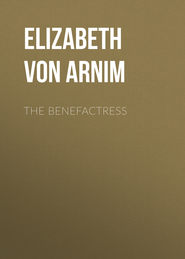По всем вопросам обращайтесь на: info@litportal.ru
(©) 2003-2024.
✖
Elizabeth and Her German Garden
Настройки чтения
Размер шрифта
Высота строк
Поля
“Oh, do you call him Sage?” cried Minora; “and always in English?”
Irais and I looked at each other. We knew what we did call him, and were afraid Minora would in time ferret it out and enter it in her note-book. The Man of Wrath looked none too well pleased to be alluded to under his very nose by our new guest as “him.”
“Husbands are always sages,” said I gravely.
“Though sages are not always husbands,” said Irais with equal gravity. “Sages and husbands—sage and husbands—” she went on musingly, “what does that remind you of, Miss Minora?”
“Oh, I know,—how stupid of me!” cried Minora eagerly, her pencil in mid-air and her brain clutching at the elusive recollection, “sage and,—why,—yes,—no,—yes, of course—oh,” disappointedly, “but that’s vulgar—I can’t put it in.”
“What is vulgar?” I asked.
“She thinks sage and onions is vulgar,” said Irais languidly; “but it isn’t, it is very good.” She got up and walked to the piano, and, sitting down, began, after a little wandering over the keys, to sing.
“Do you play?” I asked Minora.
“Yes, but I am afraid I am rather out of practice.”
I said no more. I know what that sort of playing is.
When we were lighting our bedroom candles Minora began suddenly to speak in an unknown tongue. We stared. “What is the matter with her?” murmured Irais.
“I thought, perhaps,” said Minora in English, “you might prefer to talk German, and as it is all the same to me what I talk—” “Oh, pray don’t trouble,” said Irais. “We like airing our English—don’t we, Elizabeth?”
“I don’t want my German to get rusty though,” said Minora; “I shouldn’t like to forget it.”
“Oh, but isn’t there an English song,” said Irais, twisting round her neck as she preceded us upstairs, “‘’Tis folly to remember, ‘tis wisdom to forget’?”
“You are not nervous sleeping alone, I hope,” I said hastily.
“What room is she in?” asked Irais.
“No. 12.”
“Oh!—do you believe in ghosts?”
Minora turned pale.
“What nonsense,” said I; “we have no ghosts here. Good-night. If you want anything, mind you ring.”
“And if you see anything curious in that room,” called Irais from her bedroom door, “mind you jot it down.”
December 27th—It is the fashion, I believe, to regard Christmas as a bore of rather a gross description, and as a time when you are invited to over-eat yourself, and pretend to be merry without just cause. As a matter of fact, it is one of the prettiest and most poetic institutions possible, if observed in the proper manner, and after having been more or less unpleasant to everybody for a whole year, it is a blessing to be forced on that one day to be amiable, and it is certainly delightful to be able to give presents without being haunted by the conviction that you are spoiling the recipient, and will suffer for it afterward. Servants are only big children, and are made just as happy as children by little presents and nice things to eat, and, for days beforehand, every time the three babies go into the garden they expect to meet the Christ Child with His arms full of gifts. They firmly believe that it is thus their presents are brought, and it is such a charming idea that Christmas would be worth celebrating for its sake alone.
As great secrecy is observed, the preparations devolve entirely on me, and it is not very easy work, with so many people in our own house and on each of the farms, and all the children, big and little, expecting their share of happiness. The library is uninhabitable for several days before and after, as it is there that we have the trees and presents. All down one side are the trees, and the other three sides are lined with tables, a separate one for each person in the house. When the trees are lighted, and stand in their radiance shining down on the happy faces, I forget all the trouble it has been, and the number of times I have had to run up and down stairs, and the various aches in head and feet, and enjoy myself as much as anybody. First the June baby is ushered in, then the others and ourselves according to age, then the servants, then come the head inspector and his family, the other inspectors from the different farms, the mamsells, the bookkeepers and secretaries, and then all the children, troops and troops of them—the big ones leading the little ones by the hand and carrying the babies in their arms, and the mothers peeping round the door. As many as can get in stand in front of the trees, and sing two or three carols; then they are given their presents, and go off triumphantly, making room for the next batch. My three babies sang lustily too, whether they happened to know what was being sung or not. They had on white dresses in honour of the occasion, and the June baby was even arrayed in a low-necked and short-sleeved garment, after the manner of Teutonic infants, whatever the state of the thermometer. Her arms are like miniature prize-fighter’s arms—I never saw such things; they are the pride and joy of her little nurse, who had tied them up with blue ribbons, and kept on kissing them. I shall certainly not be able to take her to balls when she grows up, if she goes on having arms like that.
When they came to say good-night, they were all very pale and subdued. The April baby had an exhausted-looking Japanese doll with her, which she said she was taking to bed, not because she liked him, but because she was so sorry for him, he seemed so very tired. They kissed me absently, and went away, only the April baby glancing at the trees as she passed and making them a curtesy.
“Good-bye, trees,” I heard her say; and then she made the Japanese doll bow to them, which he did, in a very languid and blase fashion. “You’ll never see such trees again,” she told him, giving him a vindictive shake, “for you’ll be brokened long before next time.”
She went out, but came back as though she had forgotten something.
“Thank the Christkind so much, Mummy, won’t you, for all the lovely things He brought us. I suppose you’re writing to Him now, isn’t you?”
I cannot see that there was anything gross about our Christmas, and we were perfectly merry without any need to pretend, and for at least two days it brought us a little nearer together, and made us kind. Happiness is so wholesome; it invigorates and warms me into piety far more effectually than any amount of trials and griefs, and an unexpected pleasure is the surest means of bringing me to my knees. In spite of the protestations of some peculiarly constructed persons that they are the better for trials, I don’t believe it. Such things must sour us, just as happiness must sweeten us, and make us kinder, and more gentle. And will anybody affirm that it behoves us to be more thankful for trials than for blessings? We were meant to be happy, and to accept all the happiness offered with thankfulness—indeed, we are none of us ever thankful enough, and yet we each get so much, so very much, more than we deserve. I know a woman—she stayed with me last summer—who rejoices grimly when those she loves suffer. She believes that it is our lot, and that it braces us and does us good, and she would shield no one from even unnecessary pain; she weeps with the sufferer, but is convinced it is all for the best. Well, let her continue in her dreary beliefs; she has no garden to teach her the beauty and the happiness of holiness, nor does she in the least desire to possess one; her convictions have the sad gray colouring of the dingy streets and houses she lives amongst—the sad colour of humanity in masses. Submission to what people call their “lot” is simply ignoble. If your lot makes you cry and be wretched, get rid of it and take another; strike out for yourself; don’t listen to the shrieks of your relations, to their gibes or their entreaties; don’t let your own microscopic set prescribe your goings-out and comings-in; don’t be afraid of public opinion in the shape of the neighbour in the next house, when all the world is before you new and shining, and everything is possible, if you will only be energetic and independent and seize opportunity by the scruff of the neck.
“To hear you talk,” said Irais, “no one would ever imagine that you dream away your days in a garden with a book, and that you never in your life seized anything by the scruff of its neck. And what is scruff? I hope I have not got any on me.” And she craned her neck before the glass.
She and Minora were going to help me decorate the trees, but very soon Irais wandered off to the piano, and Minora was tired and took up a book; so I called in Miss Jones and the babies—it was Miss Jones’s last public appearance, as I shall relate—and after working for the best part of two days they were finished, and looked like lovely ladies in widespreading, sparkling petticoats, holding up their skirts with glittering fingers. Minora wrote a long description of them for a chapter of her book which is headed Noel,—I saw that much, because she left it open on the table while she went to talk to Miss Jones. They were fast friends from the very first, and though it is said to be natural to take to one’s own countrymen, I am unable altogether to sympathise with such a reason for sudden affection.
“I wonder what they talk about?” I said to Irais yesterday, when there was no getting Minora to come to tea, so deeply was she engaged in conversation with Miss Jones.
“Oh, my dear, how can I tell? Lovers, I suppose, or else they think they are clever, and then they talk rubbish.”
“Well, of course, Minora thinks she is clever.”
“I suppose she does. What does it matter what she thinks? Why does your governess look so gloomy? When I see her at luncheon I always imagine she must have just heard that somebody is dead. But she can’t hear that every day. What is the matter with her?”
“I don’t think she feels quite as proper as she looks,” I said doubtfully; I was for ever trying to account for Miss Jones’s expression.
“But that must be rather nice,” said Irais. “It would be awful for her if she felt exactly the same as she looks.”
At that moment the door leading into the schoolroom opened softly, and the April baby, tired of playing, came in and sat down at my feet, leaving the door open; and this is what we heard Miss Jones saying—
“Parents are seldom wise, and the strain the conscientious place upon themselves to appear so before their children and governess must be terrible. Nor are clergymen more pious than other men, yet they have continually to pose before their flock as such. As for governesses, Miss Minora, I know what I am saying when I affirm that there is nothing more intolerable than to have to be polite, and even humble, to persons whose weaknesses and follies are glaringly apparent in every word they utter, and to be forced by the presence of children and employers to a dignity of manner in no way corresponding to one’s feelings. The grave father of a family, who was probably one of the least respectable of bachelors, is an interesting study at his own table, where he is constrained to assume airs of infallibility merely because his children are looking at him. The fact of his being a parent does not endow him with any supreme and sudden virtue; and I can assure you that among the eyes fixed upon him, not the least critical and amused are those of the humble person who fills the post of governess.”
“Oh, Miss Jones, how lovely!” we heard Minora say in accents of rapture, while we sat transfixed with horror at these sentiments. “Do you mind if I put that down in my book? You say it all so beautifully.”
“Without a few hours of relaxation,” continued Miss Jones, “of private indemnification for the toilsome virtues displayed in public, who could wade through days of correct behaviour? There would be no reaction, no room for better impulses, no place for repentance. Parents, priests, and governesses would be in the situation of a stout lady who never has a quiet moment in which she can take off her corsets.”
“My dear, what a firebrand!” whispered Irais. I got up and went in. They were sitting on the sofa, Minora with clasped hands, gazing admiringly into Miss Jones’s face, which wore a very different expression from the one of sour and unwilling propriety I have been used to seeing.
“May I ask you to come to tea?” I said to Minora. “And I should like to have the children a little while.”
She got up very reluctantly, but I waited with the door open until she had gone in and the two babies had followed. They had been playing at stuffing each other’s ears with pieces of newspaper while Miss Jones provided Minora with noble thoughts for her work, and had to be tortured afterward with tweezers. I said nothing to Minora, but kept her with us till dinner-time, and this morning we went for a long sleigh-drive. When we came in to lunch there was no Miss Jones.
“Is Miss Jones ill?” asked Minora.
“She is gone,” I said.
“Gone?”
“Did you never hear of such things as sick mothers?” asked Irais blandly; and we talked resolutely of something else.
All the afternoon Minora has moped. She had found a kindred spirit, and it has been ruthlessly torn from her arms as kindred spirits so often are. It is enough to make her mope, and it is not her fault, poor thing, that she should have preferred the society of a Miss Jones to that of Irais and myself.
At dinner Irais surveyed her with her head on one side. “You look so pale,” she said; “are you not well?”
Minora raised her eyes heavily, with the patient air of one who likes to be thought a sufferer. “I have a slight headache,” she replied gently.











